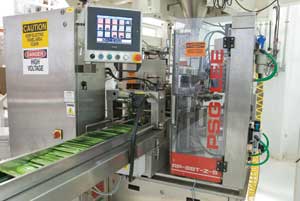
“When my father, Farid, started the company 20 years ago, Bassé Nuts became the first company in Canada to utilize the traditional Mediterranean dry-roasting process, which allows the nut to retain its original taste and freshness,” explains Bassé. “Until that time, packaged nuts in Canada were all cooked in oil.”
In the Mediterranean process, the nuts are placed in a large drum and flavored with sea salt and the drum is heated to a specific temperature for roasting the nuts to produce a delicious flavor, Bassé relates, while maintaining the nuts’ nutritional properties.
Nowadays, Bassé’s Mediterranean roasting process is performed by the latest equipment on the market—an all-in-one machine from Heat and Control, Inc. that automatically roasts, dries, glazes and seasons the product.

During its first six years of operation, Bassé recalls, the company acted mainly as a nuts and dried fruits wholesaler, and while the business was doing fairly well, Bassé says he saw a promising opportunity to expand market share by creating its own brand and moving into the retail market.
“We first starting selling the Bassé line of nuts in 1996,” Bassé recalls, adding that quitting the wholesale business was always going to be risky.
“But while any initial change in business plan can be somewhat contentious,” he reflects, “we were very relieved early on when our high-quality brand started moving quite quickly off the shelves.”
While the Bassé Nuts brand can today be found at leading Canadian retailers Walmart, Sobeys, Loblaws, Costco and other grocers throughout North America, the company also supplies many Canadian food distributors with private-label product offerings, which now account for about 40 per cent of its output.
Now considered to be a leader in the private-label segment of the industry in Canada, Bassé first began offering co-packing services in 1997 for grocery retailers Provigo, Dollarama and Subway—according to the company, which today employs 45 people over a two-shift, six-days-a-week work schedule to keep up with the demand.
Advertisement

